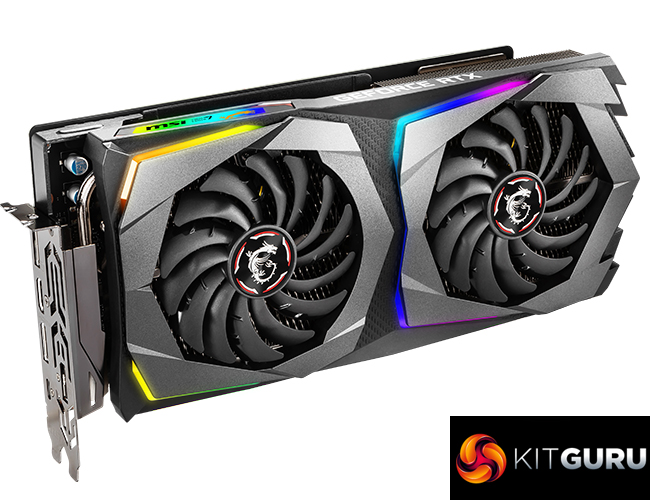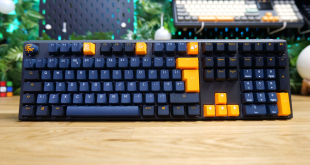With the launch of Nvidia's RTX 2070 cards, today we have analysed the custom cooled MSI RTX 2070 Gaming Z 8G.
We'll start with the card itself, and I have to say this is the best-looking aftermarket RTX card I have seen so far. I love the gunmetal grey and black shroud, while the two-tone brushed metal backplate looks fantastic. RGB fanatics will also find a lot to like with MSI's LED implementation.
On top of its good looks, the Gaming Z runs very cool – we saw it peak at just 68C. This makes it one of the coolest-running cards we've tested over the last 6 months. Considering it is very quiet as well – you would be very hard pressed to hear it once installed in a case – we think MSI has done a very good job with its 7th generation Twin Frozr cooling solution.
We did see power consumption figures about 40W higher than what Nvidia's Founders Edition card is rated for, but we have to remember the Gaming Z is clocked 120MHz faster than that card and thus it is going to draw more power as well. It is unlikely to bother anyone spending £500+ on a graphics card.
The big question mark, however, has always been about how the RTX 2070 performs in games – Nvidia has stayed very quiet on the matter. Before diving into a breakdown of the performance, you do have to remember the Gaming Z is a top-end RTX 2070 with a custom PCB and factory overclock. So it is essentially a best-case scenario for the RTX 2070.
With that being said, we'll start by comparing it to the GTX 1080. At 1440p, we saw the 2070 perform on average 9% faster than the 1080, and at 4K it was closer to 13% faster than a 1080. The GTX 1080 Ti, however, is on average 11% faster than the 2070 at both 1440p and 4K resolutions.
Those figures are taken from games you can go out and play today – so we don't yet know how ray tracing and DLSS will affect actual games. The test demos we've seen – provided by Nvidia – are obviously promising and do show that Turing is several times better at ray tracing than Pascal. Even then, though, we don't know how that will translate into actual gameplay, especially when the first games with ray tracing support will use a hybrid method of rendering – Shadow of the Tomb Raider, for instance, will have ray traced shadows but rely on rasterisation for the rest of the image. How Turing will perform in that situation, we just don't know.
Pricing is also tricky for the RTX 2070. Nvidia's Founders Edition will cost £569 – and while we have not yet been able to find an actual retail price, the MSRP for the MSI Gaming Z is £605.99. Nvidia has told us to expect more reference-clocked RTX 2070 cards, with a ‘suggested MSRP' of £459 here in the UK, but I can only judge what I have tested, and that is this MSI card for £605.
Looking on Overclockers UK, the cheapest GTX 1080 Ti is a custom card from Gigabyte, priced at £639 – over the weekend it was even lower at £599. That means, for just an extra £34, you could get a 1080 Ti instead of the RTX 2070, and that will perform about 11% faster than the 2070 in games you can actually play today. Even if we compare with a GTX 1080, custom solutions now start at £499 – meaning you will pay £105 more for this 2070 than the cheapest 1080, and get a performance increase of between 9-13%.
For me, I have to say the RTX 2070 at £600 is a tough sell. Matters are not helped by the fact that the xx70 series cards have traditionally been bang-for-buck favourites – both the GTX 970 and 1070 cards were immensely popular with gamers because they offered a sensible middle ground between price and performance. I don't feel like the MSI Gaming Z 2070 is appealing in the same way.
Of course, we are looking at a flagship 2070 card here – cheaper cards at Nvidia's £459 MSRP could well offer better value, especially if we can actually see some ray tracing benchmarks for games you can go out and play today. Until I can review RTX 2070 cards at that price, however, I can't say what they would be like.
For now, though, the MSI RTX 2070 Gaming Z 8G is undoubtedly a fine card – it is cool, quiet, and ships with a hefty factory overclock. Until we actually know what ray tracing is going to be like in games, though, I can't help but feel those spending £600 on a graphics card would be better served with a GTX 1080 Ti.
At the time of writing, we are still waiting for retailers to list RTX 2070 cards – we will update this review when we have a buy link.
Pros
- Very good-looking with stylish backplate.
- Cool and quiet.
- Runs very fast out of the box.
Cons
- Just £35 cheaper than GTX 1080 Ti – which is 11% faster.
- We still don't know how ray tracing will perform in real games.
KitGuru says: The MSI RTX 2070 Gaming Z 8GB is a great card. Its highly clocked, performs well in games and runs cool. Sadly without Ray tracing games available right now it is a tough sell against the slightly more expensive GTX 1080 ti.
 KitGuru KitGuru.net – Tech News | Hardware News | Hardware Reviews | IOS | Mobile | Gaming | Graphics Cards
KitGuru KitGuru.net – Tech News | Hardware News | Hardware Reviews | IOS | Mobile | Gaming | Graphics Cards




